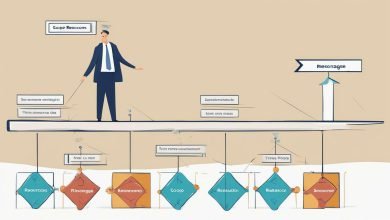
Quality assurance engineering is an essential role in various industries and plays a critical role in ensuring customer satisfaction. If you are interested in becoming a professional quality assurance engineer, this guide is for you. In this article, we will explore the responsibilities and tasks involved in quality assurance engineering, the skills and qualifications required to excel in this role, and the various methodologies used in the industry.
By following this guide, you will gain insights into the steps and strategies required to build practical experience, develop essential skills, and stay updated with industry trends. Whether you are a seasoned professional or just starting in the field, this guide will provide valuable insights to help you become a professional quality assurance engineer.
Key Takeaways:
- Quality assurance engineering is an important role in various industries.
- Responsibilities of a quality assurance engineer include ensuring product quality and customer satisfaction.
- Skills and qualifications required to excel as a quality assurance engineer include technical proficiency and soft skills.
- The quality assurance process and methodologies are essential in ensuring successful product development.
- Networking and professional development are important for career growth in the quality assurance field.
Understanding the Role of a Quality Assurance Engineer
Quality assurance engineers are responsible for ensuring that products and services meet the required quality standards. This important role is crucial in various industries, including software development, manufacturing, healthcare, and many others. Professional quality assurance engineers have a vital responsibility to ensure that the products meet the quality expectations of customers.
The responsibilities of a quality assurance engineer can vary depending on the industry and the type of product being developed. However, in general, the role involves testing products, identifying defects or issues, and collaborating with development teams to resolve them. The goal is to ensure that the final product meets or exceeds customer expectations.
Becoming a professional quality assurance engineer requires a specific set of skills and qualities. These include analytical thinking, attention to detail, problem-solving skills, and the ability to work well in a team environment. Additionally, proficiency in testing methodologies and tools as well as programming languages is also an essential requirement for quality assurance engineers.
Understanding the Role of a Quality Assurance Engineer
Quality assurance engineers play a vital role in ensuring that a product or service meets the quality standards required by customers and regulatory authorities. They are responsible for developing and executing test plans to identify defects and issues with a product. They collaborate with development teams to resolve these issues and ensure that the final product is of high quality.
Professional quality assurance engineers must possess a strong understanding of the product lifecycle and development process. They must be able to communicate effectively with development teams to understand requirements and to develop test cases that adequately test the product. They are also responsible for tracking and reporting on defects and issues, and working with development teams to resolve them in a timely and efficient manner.
In addition to technical skills, quality assurance engineers must possess strong communication skills. They must be able to communicate effectively with a variety of stakeholders, including developers, project managers, and customers. They must be able to effectively explain test results and defects to these stakeholders and work collaboratively with them to ensure that a high-quality product is delivered.
Qualifications and Education for Quality Assurance Engineers
Becoming a quality assurance engineer requires a significant amount of education and qualifications. While there is no one set educational path, there are several steps aspiring professionals can take to enhance their credentials and increase their chances for success.
Educational Paths
Many quality assurance engineers have a degree in computer science or engineering. These degrees provide students with the necessary technical skills and knowledge to understand software development and testing. Additionally, some universities now offer specific degrees in quality assurance or software testing.
However, a degree is not always necessary. Some quality assurance engineers have degrees in other fields and have gained experience through internships or entry-level positions. Certifications, such as the International Software Testing Qualifications Board (ISTQB) certification, can also enhance one’s qualifications and demonstrate expertise in the field.
Continuous Learning
Regardless of one’s educational background, continuous learning is essential in the QA field. As technology evolves, so do testing methodologies and tools. Staying updated on industry trends and advancements is critical for success.
One way to stay current is to attend training workshops or conferences. Many industry organizations offer these events, providing opportunities to network with professionals and learn about the latest developments in the field. Additionally, reading industry publications and participating in online forums can also enhance one’s knowledge and keep skills sharp.
| Certifications | Organizations |
|---|---|
| ISTQB Certification | International Software Testing Qualifications Board (ISTQB) |
| Certified Software Quality Analyst (CSQA) | QAI Global Institute |
| Certified Associate in Software Testing (CAST) | Software Certifications |
Overall, pursuing an educational path, obtaining certifications, and keeping up with industry trends are important steps in becoming a professional quality assurance engineer. Continuous learning and development are essential for success in this field.
Gaining Practical Experience in Quality Assurance
Now that you have a better understanding of the role of a quality assurance engineer, it’s time to gain practical experience. Here are some steps to becoming a professional QA engineer:
1. Look for internships
Internships are a great way to get your foot in the door. Look for opportunities at companies that interest you. This will give you hands-on experience and help you build your network.
2. Apply for entry-level positions
Entry-level positions, such as QA tester or junior QA engineer, are a great way to gain experience and learn from more experienced professionals. Apply to as many positions as possible to increase your chances of landing a job.
3. Get on-the-job training
Many companies offer on-the-job training for QA engineers. Take advantage of this opportunity to learn new skills and techniques.
4. Network with other professionals
Networking is key to success in any field. Attend industry events and conferences, and connect with other QA professionals on social media. Building relationships will help you learn about new job opportunities and stay up-to-date on industry trends.
5. Keep learning
Technology is constantly evolving, so it’s important to stay up-to-date on the latest tools and techniques. Take online courses, attend workshops, and read industry blogs. The more you know, the better equipped you’ll be to excel as a QA engineer.
Developing Essential Skills for Quality Assurance Engineers
Being a professional quality assurance engineer requires a diverse set of skills, ranging from technical expertise to effective communication and collaborative problem solving.
Technical Skills
Technical skills are essential for quality assurance engineers. They must have a solid understanding of testing methodologies, test automation, and various quality assurance tools. Familiarity with programming languages such as Java, Python, and C# is also necessary. Quality assurance engineers should understand the software development process and know how to create test cases, execute them, analyze results, and report bugs.
Soft Skills
Effective communication and collaboration with various stakeholders are crucial to ensure that the product meets the requirements and specifications. Quality assurance engineers should possess strong interpersonal skills, including the ability to communicate clearly and concisely, listen actively and empathetically, and work efficiently and effectively in a team. They should also have a keen attention to detail, analytical skills, and critical thinking ability, which are essential to identify and solve complex problems.
Practical Tips for Skill Development
In order to develop these essential skills, aspiring quality assurance engineers can participate in online courses, attend training sessions, and join quality assurance communities to learn about the latest industry trends and best practices. They can also read books, white papers, and blogs that provide insights into the software testing field. Practicing testing methodologies, participating in hackathons and testing competitions, and working on open-source projects can help sharpen technical skills and gain practical experience.
Understanding the QA Process and Methodologies
Becoming a professional quality assurance engineer requires a thorough understanding of the QA process and methodologies used in the industry. Quality assurance is a critical part of the software development lifecycle and involves a systematic approach to testing for defects and ensuring quality.
There are several testing techniques and approaches used in the QA process, such as manual testing, automated testing, and exploratory testing. Manual testing involves testers manually executing test cases to identify defects and determine if the product meets the specified requirements. Automated testing, on the other hand, involves using tools and scripts to automatically execute test cases and validate the product’s functionality. Exploratory testing involves testing the product without pre-defined steps or test cases, allowing testers to explore the product and identify defects.
It’s essential to follow a structured QA process to ensure the product meets the customer’s requirements and stands up to its intended use. The QA process typically involves planning, designing, executing, and reporting on test results. It’s important to maintain documentation of the testing process and results to ensure the product’s quality.
Software Testing Life Cycle (STLC)
Software Testing Life Cycle (STLC) is a standardized process used in the industry to manage QA activities. The STLC consists of several phases, starting with planning and moving through the design, execution, and reporting phases. Each phase has specific goals and objectives, and progress through the phases should be tracked and reported.
| STLC Phase | Description |
|---|---|
| Requirement Analysis | Understanding the product requirements and specifications. |
| Test Planning | Developing a test plan based on the requirements and goals of the testing process. |
| Test Design | Developing test cases and test scenarios based on the requirements and test plan. |
| Test Execution | Executing the test cases and scenarios and identifying defects in the product. |
| Test Reporting | Documentation of the testing process and results. |
Following the STLC helps ensure a structured approach to quality assurance and improves efficiency and accuracy in the testing process.
Overall, understanding the QA process and methodologies is crucial for becoming a successful quality assurance engineer. Staying up to date with industry trends and best practices can help improve testing accuracy and efficiency, resulting in high-quality products and customer satisfaction.
Leveraging Automation in Quality Assurance
Automation is an integral part of modern quality assurance, enabling faster and more accurate testing while reducing manual effort. Aspiring QA engineers should embrace automation and learn how to leverage it for better results. Here are some tips on how to become a QA engineer who excels in automation:
1. Learn the basics of programming:
To use automation tools effectively, QA engineers need to have a good understanding of programming concepts and languages. While not all automation tools require coding knowledge, having a foundation in programming can help in customizing scripts and debugging errors. Learning a programming language like Python, Java, or Ruby can be a good starting point.
2. Familiarize yourself with automation tools:
There are several automation tools and frameworks available in the market, each having different features and capabilities. Some of the popular tools used in QA include Selenium, Appium, and JMeter. As a QA engineer, it is essential to have hands-on experience with these tools and learn their functionalities and use cases.
3. Identify the right areas for automation:
While automation can provide significant benefits in testing, not every aspect of testing can be automated. It is crucial to identify areas where automation can bring the most value, such as regression testing, load testing, and performance testing. Focusing on the right areas for automation can result in better ROI and more efficient testing.
4. Collaborate with developers:
Automation in QA requires collaboration between QA engineers and developers. QA engineers should work closely with developers to understand the application’s architecture and design automated tests that align with the development process. This can help in identifying and resolving issues early in the development cycle.
5. Stay updated with new automation trends and techniques:
The field of automation is constantly evolving, with new tools and techniques emerging regularly. Aspiring QA engineers must stay updated with the latest trends and advancements in automation to stay ahead of the competition. Attending industry events, webinars, and following relevant blogs can help in staying updated with the latest automation trends.
By following these tips, aspiring QA engineers can become proficient in automation and add value to their organizations by improving the quality of their products and services.
Challenges and Problem-Solving in Quality Assurance
While working as a quality assurance engineer can be rewarding, it is not without its challenges. One of the biggest hurdles is identifying and troubleshooting bugs in the software. This can be a time-consuming process that requires extensive attention to detail.
Communication with development teams can also be a challenge, as QA engineers must effectively convey their findings and recommendations. It is crucial for QA engineers to develop strong communication skills to ensure that all parties are on the same page.
To overcome these challenges, QA engineers must stay up-to-date on the latest testing methodologies and tools. It is also important for them to have problem-solving skills to identify the root cause of issues and develop effective solutions.
Using Bug Tracking Tools
One of the most useful tools for QA engineers is a bug tracking system. These tools allow engineers to document and track bugs throughout the software development process. When a bug is identified, it is logged into the system and assigned to the responsible team member. This ensures that issues are addressed and resolved efficiently.
When using a bug tracking system, it is important to ensure that all bugs are properly categorized and prioritized. This allows teams to focus on the most critical issues first and avoid wasting time on less important bugs.
Effective Communication
Effective communication is key to overcoming the challenges of quality assurance engineering. QA engineers must be able to clearly communicate their findings and recommendations to development teams. They must also be able to understand the needs and requirements of stakeholders to ensure that the software meets their expectations.
One way to develop effective communication skills is to participate in cross-functional teams and projects. This allows QA engineers to work with people from different departments and backgrounds, improving their ability to communicate effectively.
Continuous Improvement
One of the key skills for QA engineers is the ability to learn and adapt to new technologies and processes. It is important to stay up-to-date with industry trends and best practices to remain competitive in the field.
Continuous learning can include attending workshops and training sessions, obtaining certifications, and participating in industry events. This not only helps to improve skills, but also demonstrates a commitment to professional development.
Networking and Professional Development for QA Engineers
Networking and professional development are essential for quality assurance engineers to stay connected with industry trends and enhance their career prospects. Below are some tips for QA engineers to build a strong professional network and stay up-to-date with the latest practices and technologies in the field.
Join Industry Organizations
Joining industry organizations such as the International Software Testing Qualifications Board (ISTQB) and the American Society for Quality (ASQ) can provide QA engineers with opportunities for knowledge sharing, networking, and professional development. These organizations offer certifications, training programs, and conferences, which can help QA engineers enhance their skills and advance their careers.
Obtain QA Certifications
Obtaining QA certifications can validate QA engineers’ knowledge and skills, enhance their credibility, and differentiate them from other professionals in the field. Certifications such as the Certified Software Tester (CST) and the Certified Software Quality Analyst (CSQA) can help QA engineers demonstrate their proficiency in QA methodologies and techniques.
Attend Conferences and Workshops
Attending conferences and workshops can provide QA engineers with opportunities to learn from industry experts, network with peers, and gain insights into emerging trends and best practices. Conferences such as the STARWEST and the Quality Assurance and Testing Conference (QATC) can offer valuable learning and networking experiences for QA engineers.
Build a Professional Network
Building a professional network can help QA engineers connect with industry peers, stay informed about job opportunities, and gain insights into industry trends and practices. QA engineers can build their network by attending industry events, participating in online forums and discussions, and connecting with colleagues and mentors.
By following these tips, QA engineers can enhance their knowledge, skills, and professional network, and advance their careers in the field of quality assurance.
Conclusion
As you can see, becoming a professional quality assurance engineer requires a combination of education, practical experience, and essential skills. By following this guide, you can develop the expertise needed to succeed in this rewarding and dynamic field.
Quality assurance engineers play a critical role in ensuring that products meet the highest standards of quality and performance. With the increasing demand for software and technology products, the need for qualified QA professionals is only expected to grow.
Whether you’re just starting out or looking to enhance your existing skills, there are plenty of opportunities to learn and grow in this field. By networking with industry professionals, attending conferences and obtaining certifications, you can stay up-to-date with the latest trends and technologies and advance your career prospects.
Remember, becoming a professional quality assurance engineer is a journey, not a destination. By staying committed to continuous learning and improvement, you can achieve your goals and make a meaningful contribution to the world of software development.
FAQ
Q: What does a quality assurance engineer do?
A: A quality assurance engineer is responsible for ensuring the quality and reliability of products or services. They conduct tests, identify defects, and work with development teams to resolve issues.
Q: Why is the role of a quality assurance engineer important?
A: The role of a quality assurance engineer is crucial in maintaining the overall quality of products or services. They help identify potential issues before they reach customers, ensuring customer satisfaction and preventing costly recalls or reputational damage.
Q: What qualifications and education do I need to become a quality assurance engineer?
A: While specific qualifications may vary, most quality assurance engineers have a degree in computer science, engineering, or a related field. Additionally, certifications such as ISTQB or CQE can enhance your credentials.
Q: How can I gain practical experience in quality assurance?
A: You can gain practical experience in quality assurance through internships, entry-level positions, or on-the-job training opportunities. Networking and connecting with industry professionals can also open doors for practical experience.
Q: What skills are essential for quality assurance engineers?
A: Quality assurance engineers require both technical and soft skills. Technical skills include proficiency in testing methodologies and tools, while soft skills like communication, problem-solving, and attention to detail are also crucial.
Q: What is the QA process and methodologies?
A: The QA process involves planning, designing, executing, and evaluating tests to ensure product quality. Different methodologies, such as Agile or Waterfall, dictate the approach to testing and quality assurance.
Q: How can automation be leveraged in quality assurance?
A: Automation can enhance efficiency and accuracy in quality assurance. Various automation tools and frameworks, such as Selenium or JUnit, can be used to automate repetitive tasks and streamline the testing process.
Q: What challenges do quality assurance engineers face?
A: Quality assurance engineers often face challenges such as troubleshooting complex issues, effectively communicating with development teams, and managing bug tracking and resolution. Continuous improvement and adaptability are crucial for overcoming these challenges.
Q: How can networking and professional development benefit QA engineers?
A: Networking and professional development provide opportunities for QA engineers to expand their knowledge, exchange ideas, and stay updated with industry trends. Attending conferences, joining organizations, and obtaining certifications can enhance career prospects.








